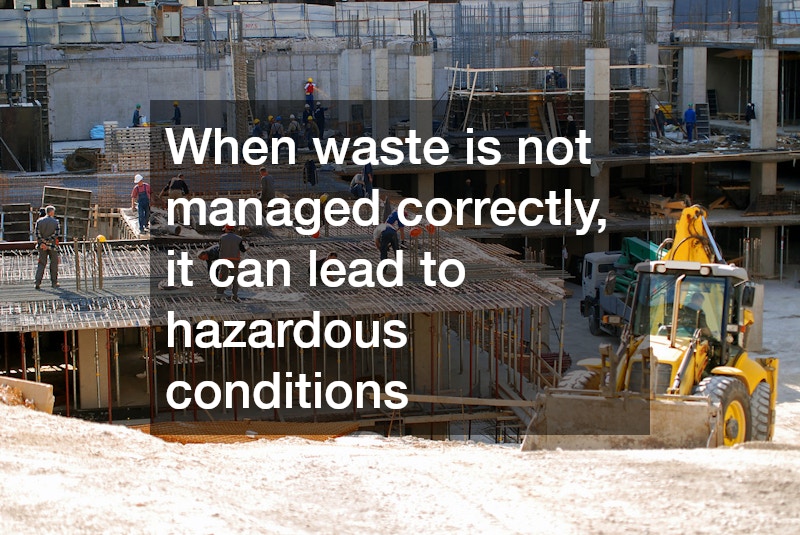
Construction sites are notorious for their chaotic environments, which often contribute to inefficiencies and safety hazards. Waste removal services play a pivotal role in maintaining order and supporting optimal working conditions on these sites. In this article, we will explore the various benefits of waste removal services, including their impact on safety, environmental sustainability, project timelines, and overall cost-effectiveness.
Why Waste Removal Is Essential for Construction Sites
Waste disposal is a crucial aspect of construction management that ensures the safety and efficiency of a project. Construction sites generate a vast array of materials, and proper waste removal helps in minimizing workplace accidents. Adhering to local and federal regulations surrounding waste management is critical, making professional services essential for compliance.
When waste is not managed correctly, it can lead to hazardous conditions that jeopardize the well-being of workers. There are numerous reports linking poorly managed waste to increased injury rates on construction sites, demonstrating the essential nature of these services. Additionally, well-maintained waste disposal practices foster a more organized environment, enhancing worker productivity.
Using a professional waste removal service helps construction companies avoid potential fines and legal issues associated with improper waste disposal. These services navigate the complexities of environmental regulations, ensuring that all waste is sorted and removed according to local laws. This not only protects the workers but also preserves the company’s reputation by demonstrating a commitment to responsible practices.
The Types of Waste Commonly Generated
Understanding the different types of waste generated on construction sites is essential for implementing effective waste management strategies. Construction waste can be broadly classified into two categories: hazardous and non-hazardous materials. Hazardous waste includes substances like asbestos, lead paint, and chemical solvents, while non-hazardous waste primarily consists of materials such as wood, metal, and concrete.
Properly categorizing waste helps in determining the appropriate disposal methods and compliance measures that need to be followed. Non-hazardous items can often be recycled or reused, mitigating the impact on landfills. On the other hand, hazardous materials require specialized handling and disposal, emphasizing the importance of hiring professionals with the expertise to manage such waste safely.
By understanding the nature of the waste produced, construction companies can create effective waste management plans that address both safety and environmental concerns. Comprehensive waste audits can assist firms in identifying the types and quantities of waste they generate, allowing for better decision-making regarding removal services. This proactive approach can greatly reduce the environmental footprint of a construction project while ensuring safety is prioritized.
How Waste Removal Services Improve Site Efficiency
Effective waste management is intrinsically linked to enhanced safety on construction sites. By removing debris and hazardous materials promptly, waste removal services help minimize risks associated with slips, trips, and falls. An organized site creates a safer working environment for all personnel involved in the project.
Additionally, professional waste removal teams are trained in safety protocols and best practices for handling potentially dangerous materials. Their expertise ensures that hazardous waste is dealt with properly, safeguarding workers from exposure to harmful substances. Regular waste removal routines also help maintain visibility on the site, reducing the likelihood of accidents caused by obstructive debris.
The implementation of a structured waste management plan fosters a culture of safety amongst construction crews. When workers see that their safety is prioritized through systematic waste handling, they are more likely to adhere to safety protocols themselves. This collective attitude contributes to a more secure working atmosphere, ultimately leading to fewer accidents and higher morale.
The Environmental Benefits of Waste Removal
In today’s environmentally conscious world, sustainable waste management is more important than ever. Using waste removal services contributes significantly to broader environmental goals by promoting recycling and the proper disposal of materials. Construction projects can generate heavy amounts of waste that, if not managed properly, could contribute vastly to landfills and environmental degradation.
Moreover, waste removal services often have systems in place for segregating recyclable materials from the general waste stream. This not only facilitates recycling but also reduces the carbon footprint of construction operations. A commitment to sustainable practices enhances the overall reputation of a construction company in a market that increasingly values environmental responsibility.
Furthermore, responsible waste removal aids in conserving natural resources. By reusing materials and ensuring that recyclables are processed properly, construction sites can help decrease the demand for new materials, thus lessening the strain on the environment. This aligns the construction industry with global sustainability efforts while benefiting companies through potential cost savings.
How Waste Removal Impacts Timeline and Finances
Engaging professional waste removal services can lead to considerable financial and scheduling efficiencies on construction sites. By streamlining waste management processes, these services allow construction teams to focus on their primary tasks without the added burden of waste disposal logistics. This efficiency supports quicker project completions, which is critical in a competitive industry.
Moreover, a well-planned waste management strategy helps prevent delays that can arise from waste buildup on-site. Too much waste can lead to chaotic conditions, hindering productivity and potentially causing costly accidents. Having a reliable waste removal service in place mitigates these risks and ensures that the project stays on track regarding timelines and budgets.
Additionally, professional waste disposal can often lead to better financial outcomes. While it may seem like an additional expense, the cost savings generated from reduced delays, improved productivity, and effluent disposal can far outweigh the initial investment. Consequently, hiring a waste removal service becomes not only a smart decision for safety and compliance but also a financially sound choice in the long run.
Waste removal services play a crucial role in enhancing the functionality and safety of construction sites. From ensuring compliance with regulations to improving environmental sustainability and aiding in cost management, the benefits are multifaceted. By incorporating professional waste management practices into construction operations, companies can foster a safer, more efficient working environment that ultimately leads to project success.





